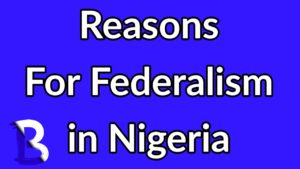Have you ever wondered why Nigeria is practicing a federal system of government and not any other system? Do you know the reasons for federalism in Nigeria? If you answer to the above questions is no, then you lucky to be here. In this article, i will comprehensively discuss the reasons for federalism in Nigeria.
Nigeria did not choose federal system of government because it is the best or most practiced system of government in the world. There are other political systems the country could have adopted but because of some reasons which I am going to share with you today, federalism seemed to be the best idea.

But before moving to the crux of this article, we will be looking briefly at the meaning and history of federalism in Nigeria. So, without wasting much time, what is a federal system of government?
Also read: Pillars of democracy: 7 Essential pillars of democracy
Meaning of federalism?
Federalism can be defined as a system of government in which political powers of the state are shared between the central government and other component units. In light of this, a constitution is said to be federal when its operates two levels of government, that is the federal and state, and each of this level exercise its different powers without interference by the other level.
On the other hand; a constitution is unitary when there are created by the law made by the central legislature and their existence depends upon the government to control, supervision of the central government. From the above explanation, one can rightly say that the constitution of Nigeria and United States of America are federal constitutions while the constitution of France and the Republic of Ireland are Unitary constitutions.
Federalism therefore involves the linkage of individuals, groups and policies in lasting but limited union in such a way as to provide for the energetic pursuit of common goals while maintaining the respective integrities of all parties.
For a better explanation of the theory of federalism, I highly recommend that you watch the video below.
Also read: Highest paying law firms in Nigeria
Origin and Nature of federalism in Nigeria
The origin of federalism in Nigeria can be traced to the colonial era. Parliamentary and Unitary system of government were in operation in Nigeria between 1914 and 1946. In 1939 sir Bernard Bourdillion made a serious constitutional proposal which concluded having regional councils with a central council in Lagos. Nigeria as a result was divided into three provinces. sir Arthur Richards strengthened this proposal in 1945 and regionalism was introduced by his administration in 1946.
In the words of Richards, regionalism was introduced to strengthen unity in diversity. Rt. Hon. Justice Udo Udoma is of the view that regionalism was introduced by the colonialists in order to divide and rule, and weaken true national unity in Nigeria.
The 1951 constitution gave more strength to regionalism with the creation of two chamber legislation in the northern and western Nigeria. This regional arrangement gave rise to ethnic sentiment and political struggle for the center among the three major ethnic groups in Nigeria. The contradictions generated by this rigional arrangement threatened Nigeria unity. Instead of designing a government that should unite the different elements in Nigeria, the colonialists fully adopted federal stem of government in 1954 and created greater regional autonomy.
It was under the 1954 constitution that federal system of government was fully adopted. It was believed that federal system of government would take care of the interest of the minority and human rights that had been the fear of the minority under colonial rule.
The constitution emphasized areas of authority between the central government and the regions. Matters, enumerated in the exclusive list are selected for the federal authority, while matters that fall within the concurrent list are selected for the federal government, and the regions. However, where there is a conflict of authority between the federal government and regional government, the federal authority supersedes.
The regional government had power over matters that are listed under the residual list. Since 1954 successively Nigerian constitution had adopted the federal system of government without much emphasis on the unity or disunity it has accorded to Nigeria. Many Nigerian ethnic groups began to agitate for their own states.
In 1963 Midwestern region was created and Nigeria became a nation of four regions. Again, in 1967 twelve states were created to appease the interest of those clamoring for states and weaken the geo-political holds of Biafra. 19 more states were created in 1976 in order to score more political advantage by the Murtala-Obasanjo regime against those that favor General Yakubu Gowon.
The Babangida administration followed the same step and created 21 states and more local governments. The states were later increased to 30 states. Abacha regime, added more states making Nigeria a federation of 36 states and Federal capital Territory at Abuja. The military were able to create more states because military decrees do not pass the same rigorous method bills pass in a democratic government.
Military administration does not apply the principle of federation. The first military head of state was dethroned for adopting unitary system of government yet successive military administration in practice follow unitary principle instead of federal system. It has been suggested that the creation of more states and local government have helped in the distribution of national cake.
On the contrary it has also been suggested that is created more diversity and conflict for the nation to grapple with. The states too have no resources for development but depended on federal grants.
Naturally, federal system of government has some distinctive features namely:
1. There must be a formal decision of government powers by the constitution between the federal and state government.
2. There must exist supremacy of the constitution, which implies that laws passed by the authority in the federal arrangement, if contrary to the constitution shall be declared to be ultra votes.
3. The constitution must be rigid to avoid frequent and unnecessary changes. Fourthly, there shall be the existence of court to interpret the constitution as it applies to cases and conflicts among the tiers of government.
By and large, it is the nature of the relationship of the federal and state governments that determines whether a state is federal or unitary. The powers that exist between the federal and state government also depends on the constitution.
MUST READ:
Why indirect rule succeeded in Northern Nigeria, SEE REASONS HERE
Top 7 Reasons for federal system of government in Nigeria
Below are the reasons why Nigeria adopted a federal system of government:
1. Historical experience

The major reason for the adoption of federal system of government in Nigeria is borne out of the historical experience that brought all the ethical groups together under one Nigeria. It has severally been emphasized by both the Northern and Western politicians that God did not create Nigeria but the British.
The British in their quest for economic wealth and geo-political edges over other Europeans in Africa made Nigeria the largest British colony in Africa. The Emergence of Nigeria as a political entity under colonial rule was not an easy affair. It came about following the necessity for administrative convenience and managerial expenses.
Moreover, it is important to note that most of the ethnic groups in Nigeria had strong political inter-group relationship before colonial rule. The history of Ijaw, Edo, Igala, Yoruba, Igbo, Nupe and Hausa Kingdoms are enriched with social-political relationships that existed before the emergence of the white man. Political institutions, Kinship ties, Origin of towns and their cultural antecedents are enriched with similar history. All these strengthen political bonds and gave Rice to unity in diversity.
2. Unity of the country:

This is also one of the reasons for federal system of government in Nigeria. Federalism was basically introduced to bring about peace and unity in the different regions of the country. In many countries of the world, federalism has emerged as a means of accommodating the growing desire of people to preserve or revive the intimacy of small societies and the growing necessity for larger combinations to mobilize the utilization of common resources.
The unity here is brought about by the desire of the component units of the federation to form union in respect of some matters. Mere desire to unite is not enough but there must be the desire to remain separate in respect to other matters. If the desire to remain separate does not exist, the the association will not be federal but unitary with some delegation of powers to local government.
Also see: Differences between 1960 and 1963 constitution of Nigeria
3. Political culture of Nigeria:

Another important factor that necessitated federalism in Nigeria was the political culture of the country. Evidently, Nigeria’s political culture was federalism friendly and that gave rise to easy adoption of federalism. As I have already explained, Nigeria is an amalgamation of three different regions with beliefs and customs. Federalism was the only solution to ensure peace and unity amongst the leaders and the citizens and that was why federalism was adopted into the Nigerian political system.
In the same way, the political culture of the United States is civic, republican and participatory. It represents a synthetic between two perspectiveneess; one is that politics of the United States should produce the good commonwealth and the other is that the principal task of politics is to create an open political market.
Also see: Reasons why lawyers wear wigs to court
4. Ethnic, Religious and Geographical Factor:

No doubt, the Ethnic, Religious and Geographical nature of Nigeria also contributed to the reason why federalism was adopted. This is so because where federal principles apply, the various ethnic groups that cannot or don’t form majority to produce large part may have the opportunity of governing themselves within their federating unit controlled by them.
Common national, racial, religious, cultural linguistic or social ties have often contributed to the unification of political unit. In some areas where major communal or other social antagonism cuts across territorial boundaries, ranging through all the federating units, communities or classes have been driven to seek to protect or strengthen their position by inter-territorial union.
The fear of ethnic groups overlapping regional boundaries and the loyalties of castes cutting of some extent across provincial political boundaries also encourage some groups to support wider federal unions. There is no doubt that geographical factored are one of the influential reasons for federalism in Nigeria. The effectiveness of linking communications has been a vital factor in geographical unit.
Also see: Historical constitutional development in Nigeria explained
5. Minority Marginalization:
Another cogent reason for federalism in Nigeria is the fear of marginalization. In other not to control only some parts of the big country, Nigeria, the colonial masters thought it wise to divide the country into different component units that will be represented in the government. This helped to solve the problem of marginalization in the leadership.
The fear of marginalization by the minority in a unitary system of government has, to a great extent, influenced the majority state support for federating states. In a Unitary system, the minority states cannot govern the entire region which is controlled by majority. Thus, federalism seemed to be the only option left for Nigeria because it allows for popular participation in government. Here, both the majority and minority are represented in the government.
6. Resource control:

The availability of resources in a particular region and the need for that area to control the resources has also been seen as a reason for a federal system in Nigeria. This has nexus with the particular sharing formula adopted. In a unitary constitution which opposes federal principles, everything belongs to the central government; the federating unit does not exist, let alone agitating for resource control. However, that is not so in a federal government system.
Take for example, in the Nigerian case of Attorney General of Federation v Attorney General of Abia and others (2002) 3 NCLR 1ar p 54, the issue of resource control in a true federalism was the bone of contention in that matter. Here, the Attorney General of the Federation Instituted the case to test the true position so that the federal government would be guided on the varying issues of derivation formula.
The Attorney General sought to know whether the 13% sharing formula of the oil producing states should include revenue from oil producing states should include revenue from oil production activities off shore. It should be noted that the Federal Military Government had earlier by fiat taken proceeds from offshore prospecting and drilling activities directly under federal eminent domain.
In his judgment, Ogundare JSC agreed that the provisions to Sections 162(2) of the constitution re-stabilized the principle of derivation. This particular corroborated federalism in Nigeria. It established that the resources of a particular state is not totally owned by the federal government.
Also see: Differences between Cross-offers and counter-offers
7. Fear of insecurity and the desire for a Union:

Another factor that prompted the adoption of federalism in Nigeria is the fear of insecurity and the desire for union. The United States, Canada, India, France and Australia adopted federalism because of the desire for security by the various ethnic units.
In Nigeria, it could be argued that our federal system of government is the creation of British colonialism. However, it is also fact that since independence Nigeria has promulgated several constitutions and that if Nigeria wanted an alternative system of government, she could have opted for it. It is also an undisputed fact that the Hausas and Yorubas fought Biafra to keep the unity of Nigeria.
Insecurity and the desire for union are the main reasons for the shift from unitary system of government to federal system of government in 1954. The Hausa Fulani and the Minorities feared the domination of political powers by the Igbos and Yorubas.
It is important to also reason that small states are prone to domination and sometimes control by the big ones. To avert this domination, states unite to form a strong, virile and stable union capable of withstanding external attacks. The USA and Canada were formed with the above interest at heart.
MUST READ:
- Problems facing the legal profession in Nigeria
- History of the legal profession in Nigeria
- Problems of Local Government in Nigeria And Solutions
- 5 important Characteristic of customary law
- Sources of Nigerian Law: everything you need to know
By way of conclusion, it is imperative to know that the reason why Nigeria is still practicing federalism today is because the system seems to be suitable for our political value and culture. Since Nigeria is a heterogeneous nation and Federalism is more practicable in such kind of nation, it is an ideal system of government.
In my view, federalism is a good system for Nigeria. It allows for popular participation in politics at every level of government. Even the masses in the rural areas of the country are allowed to participate in politics by electing their representatives into office.

Edeh Samuel Chukwuemeka, ACMC, is a lawyer and a certified mediator/conciliator in Nigeria. He is also a developer with knowledge in various programming languages. Samuel is determined to leverage his skills in technology, SEO, and legal practice to revolutionize the legal profession worldwide by creating web and mobile applications that simplify legal research. Sam is also passionate about educating and providing valuable information to people.
It was helpful, thank you .
Interested
Okay
But nigeria today became the proudable and bearable country,
we are proud to nigeria our inherited country,god bless nigeria.
I love this article,very educating and interesting
Keep it up ✨✨
thanks a lot f
or this it really helped me
Yes , I love it and I was sentitize on those reasons.
Excellent